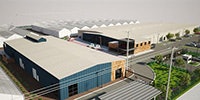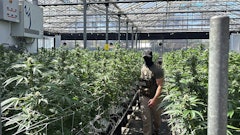
On May 14, Natura Life + Sciences announced the closing of a $91-million private financing round, a hefty bit of fundraising that will translate into what the company is calling “the largest vertically integrated cannabis campus in California.” The facility will encompass 265,000 square feet for cultivation, manufacturing, extraction, wholesale packaging, distribution and marketing operations. Natura will also run a delivery-only retail platform out of the campus.
The goal, CEO Ori Bytton told Cannabis Business Times, is to become a global cannabis company within the next 10 years.

“The reason we’re building a campus is the cannabis industry is bringing people [together] from all walks of life,” Bytton said. “It’s a new industry, [although] the plant has existed for more than 10,000 years. It’s a plant that people are using on a daily basis for a lot of different needs. We’re building a campus to combine all of that together, and we believe that that will bring the best products in the future.”
At the Sacramento campus, Bytton’s company will have chemists, product developers, marketers, growers and more teams all working alongside one another. The overarching goal, aside from efficiency, he said, is to increase each individual’s general awareness of the broader supply chain around his or her corner of the operation.
“We believe that everyone that is in the industry today is a spokesperson for cannabis and they need to be educated well,” Bytton said. “We really want to educate people on the benefits of cannabis, on what the sciences knows, so far, and it all starts with the industry.”
COO Craig Powell echoed those thoughts. He came to cannabis from consumer-packaged goods industries, where corporate teams often function more as nodes in a network. “Here,” he said, “we have the opportunity to create something pretty extraordinary in terms of experience for our employees. Not only do they get to see literally every point along the supply chain, but they also get to interact with the people who are selling the product. They’ll receive feedback [and] education from those people. … Knowledge and information are huge issues—and I should really say lack of knowledge and lack of information is really a huge issue in this space.”
The original plan behind this campus was designed for API development—active pharmaceutical ingredients. But the layout translates to how cannabis is shifting toward a more medical-research sort of operation. “It’s a design that’s been a long time in process,” he said. “It’s very precise what we’re going to do. We want to learn the best growing protocol for each strain and the cannabinoid profile for each strain in the environment that we will [maintain].”
Bytton said he intends to collect data at every point along the supply chain, right on the Natura property, in order to learn, adapt and better serve the end consumer through delivery.
And that’s the other big bet at work in Natura’s financing and development news: a move away from traditional brick-and-mortar retail licensing and toward the delivery model that’s already taking off in California.
“I may get killed for saying this,” Powell said, “but the retail experience in cannabis currently is a challenging environment. Licensing restrictions, zoning restrictions, local ordinances—first of all, there aren’t many retail establishments in California as we currently sit. Delivery affords us the opportunity—it’s really about accessibility. It affords us the opportunity to reach the consumer directly, effectively and efficiently. … It’s unusual in the CPG space to have the opportunity to have a direct relationship—communication—with your consumer. Usually you’re going through an intermediary, whether a grocery store or some other type of retail outlet.”
By continuing to gather data—both internally and through consumer delivery trends—Bytton said that Natura will hone its blueprint for longer-term goals. He plans to build 30 such campuses around the world over the next 10 years. “Basically, what we are going to learn here is how to build the best cannabis company in the world,” he said.

























